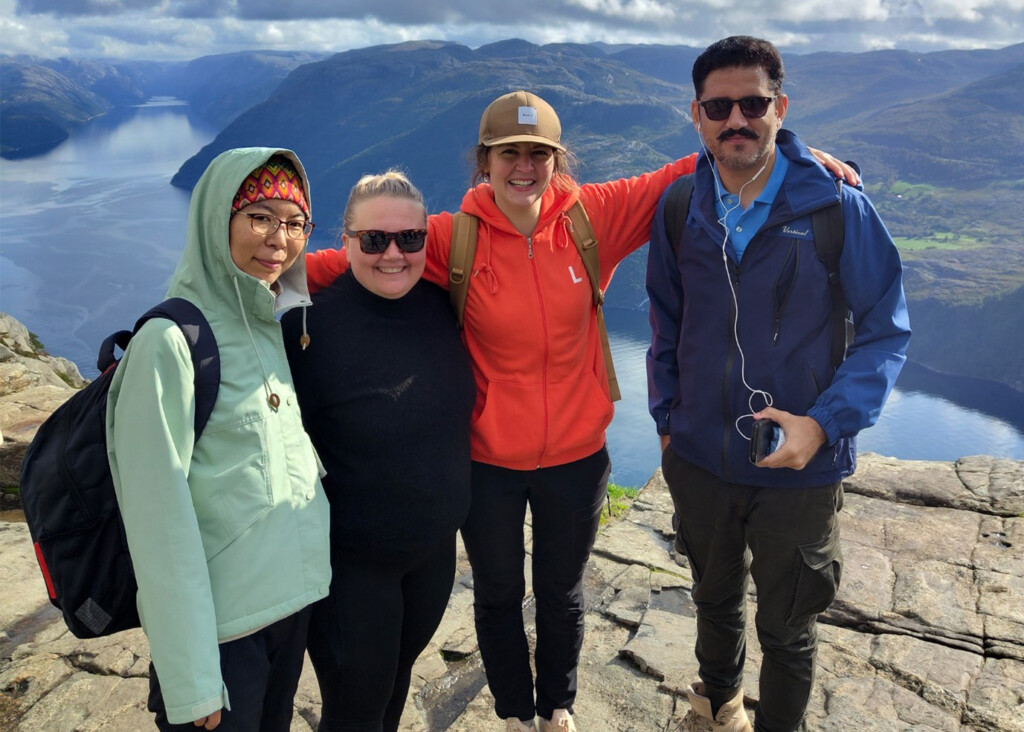
Malla Alatalo & Aulikki Laitinen-Tolonen
Students possess a lot of unexplored potential. The key mission in our project From Research to Working Life: Students as Knowledge Brokers for Entrepreneurial Development (ReWo) is to find new ways to transfer student-generated research knowledge and results to the working life.
In this article, we discuss this challenge of applying students’ knowledge into the tourism industry. We specifically examine the role of an idea manager and the potential of positioning students in this role, which could also enhance cooperation between higher education institutions and the tourism industry.
Challenge: Student-generated knowledge is not fully exploited
Theories and knowledge only become meaningful through practical application (Mäki 2019, 83). Building on this, it would be important for the knowledge and results produced by students to be made available to the world of work.
Tourism companies are reluctant to take advantage of the research, argues Cooper (Cooper 2015, 107). Without taking a position on how true this somewhat provocative statement is in our own context, it is nevertheless a wake-up call for those of us in higher education who are constantly producing new knowledge and skills through both education and RDI activities.
This is of course an extreme example, and there are certainly other reasons why research is not used, such as a lack of resources for development work or the inability to search for information. However, when talking about students and their efforts on their theses, internships, course and project cases, more opportunities should be found to put results into practice.
Our Erasmus+ funded project From Research to Working Life: Students as Knowledge Brokers for Entrepreneurial Development (ReWo) has addressed these issues with several kinds of activities. Our international consortium has four partners: the University of Maribor as a lead partner, the University of Stavanger, the Estoril Higher Institute for Tourism and Hotel Studies and the Lapland University of Applied Sciences. All the development activities of the project have been examined with particular interest to students, their knowledge and skills and how to make better use of them.
We started by gathering information on good practices in the use of student-generated knowledge and skills. And while doing so, we also touched upon the topic of cooperation between higher education and working life. In the next phase, we put our focus on exploring how different ways of visualizations can help to transfer students’ knowledge and skills. We worked together with students from each partner country: Slovenia, Norway, Finland and Portugal.
Moreover, we delved into differences between generations in working life and focused especially on generation Z. This gave us insights and a deeper understanding of how, for example, generational experiences shape people’s values at different ages. In addition, understanding the communication preferences of different generations helps us to understand how people of different ages transmit information and how they want to receive it.
Most recently, we have started to envision the role of an idea manager. Yet again, we do this together with an international group of students, academia and tourism practitioners.
Possible solutions: role of an idea manager
To remain viable and keep pace with the evolution of society, businesses constantly strive to innovate and evolve. New ideas are generated in companies but to put ideas into practice, determined work is needed. This is where idea management enters the picture. According to Mikelsone & Liela (2015, 107), idea management can be defined as “a complex process or tool of generating, evaluating and implementing ideas”. Vandenbosch, Saatcioglu & Fay (2006, 263) point out that idea management is not merely about generation of ideas but also evaluation. In addition, they underscore also the importance of recognizing the need for ideas. Idea managers are needed to guide organizations through these processes.
Tourism industry represents multi-stakeholder services in which human-centered design through co-design with students, R&D projects and tourism industry professionals require coordination and value co-creation (Jones 2017, 157). As a solution for all this is an idea manager. In the ReWo project the role of an idea manager in tourism contexts and systems is generated towards students.
The growth in tourism industry faces challenges in ecological, social and economic systems. In the twenty-first century challenges in operating environment, the role idea manager is to bring all parties together and to find solutions with higher education and working life to tackle the barriers between educators and tourism industry (Cooper, Wheeller & Ruhanen 2012, 209).
Process: cooperation and co-design
We have been collaboratively co-designing the role of an idea manager for tourism with our project team, international group of students, and tourism practitioners to address the challenges we face. Together with our project team and students (picture 1) we spent a week in Stavanger, Norway where our common mission was to develop the role of an idea manager.

We approached the topic through familiarizing ourselves with theoretical frameworks of idea management and knowledge transfer continuing to practical workshops dealing with idea generation and evaluation. Tourism practitioners and alumni from University of Stavanger devoted their valuable time to join part of the workshops and to give ideas and feedback from practical working life.
At the end of the week, we summarized the results of our work and considered together what skills and tools idea managers need (picture 2) and what kind of curriculum would be needed to develop these skills. Having students onboard in the process made this work especially interesting. After all, our plans primarily concern students, so it only makes sense to include their voices in the planning process.

All forms of collaboration within the project framework have proven to be both insightful and beneficial. Before the intensive week in Norway, we engaged various stakeholders in our project activities. We conducted interviews in each partner country, discussing the role of an idea manager with students, alumni, educators, and tourism industry practitioners.
Conclusions: equipping students with idea management skills
We believe that by equipping students with idea management tools and skills, higher education can help them excel in internships, commissioned theses, and problem-based learning assignments. When students adopt an idea manager-like approach – actively seeking, evaluating, and promoting the implementation of ideas from their working environment – they receive confirmation and validation of their development work within real-world applications.
Moreover, students acting as idea managers have the potential to serve as mediators between higher education and the tourism industry. Through idea evaluation, they become aware of development needs, which can act as a starting point for broader collaboration in education and RDI. The illustration (Picture 3), created by one of the students participating in the ReWo project, depicts the roles and relationships of an idea manager working as a knowledge broker at the intersection of higher education and the tourism industry.

As a solution, we propose a curriculum design that introduces study units offering an in-depth understanding of the role of an idea manager, equipping students with the necessary knowledge and skills. To achieve this long-term goal, we will begin by compiling the knowledge and skills accumulated during the project into a MOOC, providing a basic understanding of the topic and its background. We believe this will offer valuable insights not only for students but also for educators and RDI staff to learn the fundamentals of idea management. Idea managers are needed in the tourism sector, and acquiring these skills during studies can offer significant advantages in future careers.
Funded by the European Union. Views and opinions expressed are however those of the authors only and do not necessarily reflect those of the European Union or the European Education and Culture Executive Agency (EACEA). Neither the European Union nor EACEA can be held responsible for them.

Malla Alatalo, MA, specialist, Lapland University of Applied Sciences, malla.alatalo(at)lapinamk.fi
Aulikki Laitinen-Tolonen, MSc., Senior Lecturer, Lapland University of Applied Sciences, aulikki.laitinen-tolonen(at)lapinamk.fi
References
Cooper, C. (2015). Managing tourism knowledge. Tourism recreation research, 40(1), 107–119.
Cooper, C., Wheeller, B., & Ruhanen, L. (2012). Tourism education: Quo vadis. Critical debate in tourism, 209–227.
Jones, P. (2017). The systemic turn: Leverage for world changing. She Ji: The Journal of Design, Economics, and Innovation, 3(3), 157–163.
Mikelsone, E., & Liela, E. (2015). Literature review of idea management: Focuses and gaps. Journal of Business Management, 9, 107–121.
Mäki, K. (2019). Ammattikorkeakoulupedagogiikka – tiedon ja taidon oppimisen rajapinnassa. In H. Kotila (ed.) Ammatilliseksi opettajaksi. Haaga-Helian julkaisuja, 10(2019), 81–92.
Vandenbosch, B., Saatcioglu, A., & Fay, S. (2006). Idea management: a systemic view. Journal of Management Studies, 43(2), 259–288.
Zhang, Y. (2024). Student as an idea manager: roles and relationships to academia and industry. I will be an idea manager visualization for the project – From Research to Working Life – unpublished student assignment 21.10.2024, Lapland UAS.



